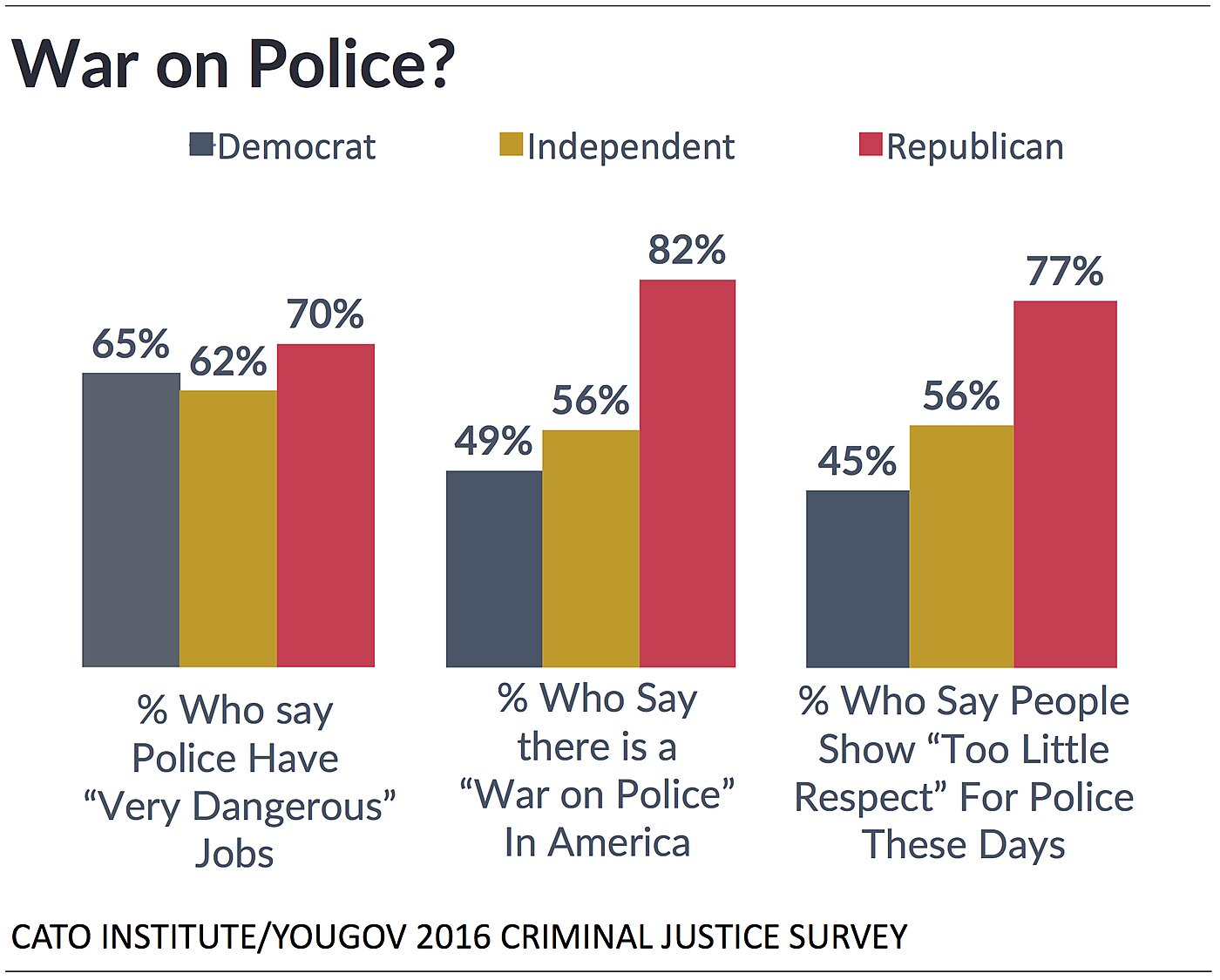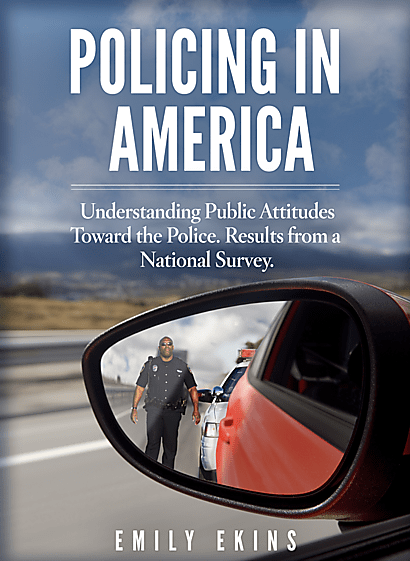Although public opinion data shows stark partisan divides in evaluations of police performance, a Cato Institute/YouGov survey shows that Americans—regardless of partisanship—are worried for police safety.
Two-thirds (65%) of respondents say that police officers have “very dangerous” jobs, 30% say police jobs are “somewhat dangerous,” and only 5% say their jobs are not very dangerous. Concerns about police safety extend across partisan groups. Six in 10 Democrats and independents as well as 7 in 10 Republicans think police jobs are “very dangerous.”
Although concern for police safety is bi-partisan, Republicans are far more worried than Democrats and independents that the police are being disrespected. More than three fourths (77%) of Republicans think that people show “too little respect” for the police these days. In contrast, only 45% of Democrats agree—a 32 point margin. Independents fall in between with 56% who believe people don’t show enough respect for the police. This pattern is not simply due to differences in partisan racial composition: white Republicans are 28 points more likely than white Democrats to worry the police are being disrespected (78% vs. 50%).[1]
Given these data, it’s less surprising that 82% of Republicans believe there is a war on police today. In contrast, 49% of Democrats agree—a 33-point margin.
Find the full public opinion report here.
These data suggest that when people talk about there being a “war on police,” for the most part, they aren’t talking about how dangerous the job is. Most Americans—Republican, Democrat, or otherwise—already believe that police have dangerous jobs. Instead, the “war on police” that Republicans are worried about is rhetorical—they believe police officers aren’t being adequately respected by the public.
There has been a temptation for police reformers to respond to claims that there is a “war on police” by providing facts and figures about how fatal occupational injuries are higher in other occupations like taxi driving, truck driving, or roofing, or how police fatalities have been on a downward trend for the past 35 years, with 2015 being one of the safest years for law enforcement. But this is not what the perceived “war on police” is all about. It’s about police not getting the respect Republicans think they deserve.
Why do Republicans care more than Democrats about people showing respect for the police? Social psychologists have found that individuals who have an above average desire for social order tend to believe that society will breakdown and devolve into chaos without strong authority figures to maintain order.[2] Consequently, these individuals tend to have greater respect for authority figures who they believe help maintain social stability. While nearly everyone cares about social stability and respecting authority to some degree, this is a more salient concern for conservatives.[3]
In fact, Republicans (42%) are nearly twice as likely as Democrats (25%) to score in the highest quartile of our Respect for Authority Index (RAI), which is based on answers to three questions that measure people’s general respect for authority without out asking about police.
“Law and order” conservatives who look to the police to prevent chaos may fear that criticizing them, or not showing them adequate deference, may undermine their legitimacy and authority—thereby fostering social disorder.[4]
Consequently, those interested in police reform may be more effective by making it clear they support the police and avoid responding to claims that there is a “war on police” by saying there is no physical war on police. Instead, acknowledge the real challenges police officers must face and demonstrate how reform will help police officers do their jobs more safety and effectively. Furthermore, show that police reform can strengthen police legitimacy by restoring public confidence in the police. This by extension will bolster the legitimacy of the law.
For public opinion analysis sign up here to receive Cato’s upcoming digest of Public Opinion Insights and public opinion studies.
The Cato Institute/YouGov national survey of 2000 adults was conducted June 6–22, 2016 using a sample drawn from YouGov’s online panel, which is designed to be representative of the U.S. population. YouGov uses a method called sample matching, and restrictions are put in place to ensure that only the people selected and contacted by YouGov are allowed to participate. The margin of sampling error for all respondents is +/-3.19 percentage points. The full report can be found here, toplines results can be found here, full methodological details can be found here.
div[1] Similarly, Hispanic Republicans are 27 points more likely than Hispanic Democrats to worry people aren’t showing enough respect to police (71% vs. 44%). However, black Republicans (35%) are about as likely as black Democrats (39%) to worry the police aren’t receiving adequate respect. This is a familiar pattern we’ve written about previously where black Republicans and black Democrats have similar views of the police even though white and Hispanic Republicans have more positive views than white and Hispanic Democrats. These data about perceptions of police being disrespected among black and Hispanic Republicans and Democrats come from combining the June 2016 and November 2015 national surveys (N=4000), which offer greater precision and smaller margins of error for subgroups. (Unweighted: Black Republicans=45, Hispanic Republicans=165, Black Democrats=630, Hispanic Democrats=409.) Results have been weighted to be representative of the national population.
div[2] See Karen Stenner, The Authoritarian Dynamic (Cambridge: Cambridge University Press, 2005), Jonathan Haidt, Jesse Graham, and Craig Joseph, “Above and Below Left-Right: Ideological Narratives and Moral Foundations,” Psychological Inquiry 20 (2009): 110–119. Jonathan Haidt, The Righteous Mind: Why Good People Are Divided by Politics and Religion (New York: Pantheon Books, 2012). Jonathan Haidt and Jesse Graham, “When Morality Opposes Justice: Conservatives Have Moral Intuitions that Liberals May Not Recognize,” Social Justice Research 20 (2012): 98–116. Jesse Graham, Jonathan Haidt, and Brian A. Nosek, “Liberals and Conservatives Rely on Different Sets of Moral Foundations,” Journal of Personality and Social Psychology 98, No. 5 (2009): 1029–46. div[3] Ibid. div[4] For example, see Heather MacDonald, “The Danger of the “Black Lives Matter” Movement,” Imprimis 45 (2016), http://imprimis.hillsdale.edu/the-danger-of-the-black-lives-matter-move….


